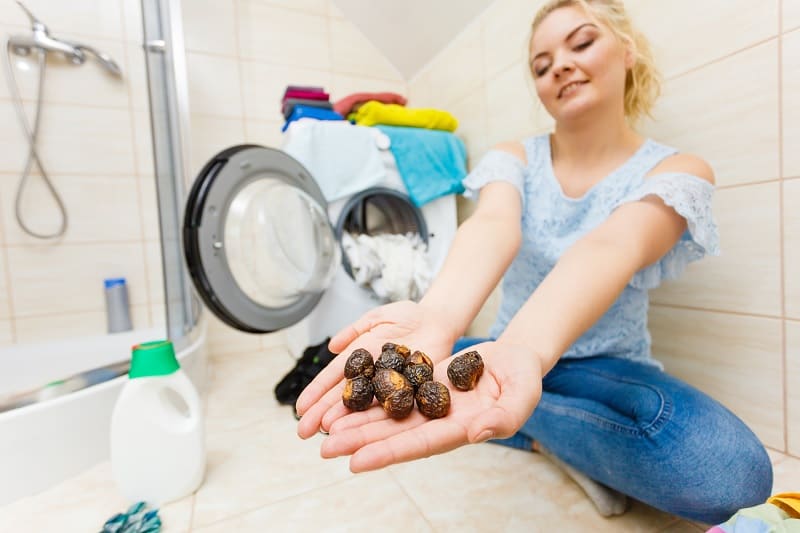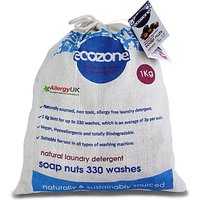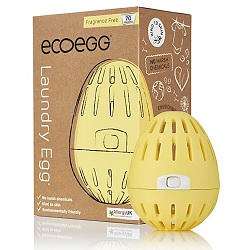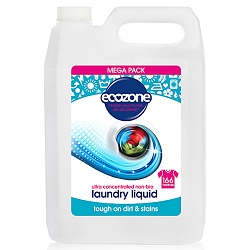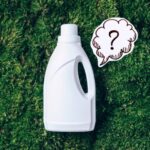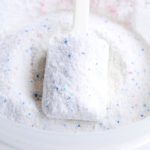When it comes to washing our clothes, we all have our own way of doing things.
Some of us separate our colours, some of us only use washing tablets, some of us pop in a bit of scent booster or Zoflora… there are close to hundreds of options when it comes to cleaning your laundry!
If you’re looking to go eco or just want an alternative for washing powder we’ve got something for you.
These alternatives can be used if you’re looking for something cheaper or more eco-friendly, or if you run out of washing powder and need something else to use at short notice.
Alternatives to Washing Powder
Washing tabs and pods are a much more efficient way to apply a detergent to your wash.
There’s no messy powder clogged inside the washing machine drawer and you don’t get the risk of overdosing your washing, which can result in damage to certain fabrics, not to mention the impact on the environment.
Despite the useful nature of washing tablets, they are still adding chemicals into the water system and in turn causing harm to marine life. Therefore, it’s worth considering natural and eco-friendly alternatives.
1. Soap nuts – A natural alternative to washing powder
If you want to keep all of your laundry day products as natural as possible, you can’t get better than soap nuts, as they grow on trees in the Himalayas.
Soap nuts have been used for centuries in India and Nepal and not only do they leave your washing fresh and clean, but they are great for sensitive skin! You only need a small handful of nutshell halves (around 4 or 5) for each wash and they can be reused a number of times. A 1 kg bag should suffice for around 100 washes!
The Kind Wash Natural Indian Soap Nuts
This 1 kg bag of soap nuts from The Kind Wash should last you 240 washes, so they’re not just eco-friendly, they’re great value as well. They are free from nasty chemicals and soft on sensitive skin.
Ecozone Soap Nuts
This bag of soap nuts from Ecozone should last for 330 washes, so it could keep you going for a whole year. They are organic and sustainably sourced, and come in biodegradable and recyclable packaging.
How to use soap nuts
- Pop 4-5 shells into a small cotton bag – these are usually provided when you purchase soap nuts. If not, these little cotton drawstring bags would be ideal.
- Close the drawstring and loosely tie the strings together in a bow – just so the nuts don’t fall out.
- Place the bag inside your drum on top of the wash load and carry out your normal wash!
- Re-use these soap nuts multiple times until you notice they are no longer lathering.
2. Laundry eggs – A cheaper alternative to washing powder
If you want a washing tool which will help you save lots of money, not to mention lowering your chemical output when doing the laundry, then a laundry ball or laundry egg might be the option for you.
These eggs or balls contain hypoallergenic cleaning pellets which can be used in multiple washes – some even claim to work for up to 1000 washes!
Eco Egg Laundry Egg
The Ecoegg Laundry Egg uses mineral pellets inside a recyclable plastic egg to clean your clothes without the need for laundry detergent. It is reusable and can be used for around 70 washes. It’s very quick and easy to use, and saves the mess and faff of using washing powder or liquid.
How to use an Eco Egg
- When you first receive your eco egg, you will have to add in the pellets – the instructions will tell you how many packets you need to add.
- Once the pellets are inside, twist your egg back together and lock in place.
- Pop the eco egg on top of your laundry inside the drum and start your normal wash cycle.
- Once the pellets have depleted, you will need to refill the egg. If you run out of pellets, you can buy them separately, check out these Spring Blossom scented pellets for 50 washes.
3. Eco laundry liquid – an environmentally friendly alternative to washing powder
You can buy eco-friendly detergent from a number of eco shops and also from those great refill stations which often opt for more environmentally-friendly cleaning products.
These detergents are made with more natural ingredients, have recyclable packaging and use no artificial colours or brighteners.
Ecoleaf, Ecover and Ecozone are probably the most well-known eco cleaning brands in the UK at the moment, but there are plenty of new environmentally conscious cleaning brands popping up all of the time.
Ecozone Ultra-Concentrated Non-Bio Laundry Liquid 5 Litres
This plant-based non-bio laundry liquid is an easy-to-use and eco-friendly alternative to washing powder. It is vegan, free from harmful chemicals and works well at both cold and warm temperatures.
4. DIY washing detergent – A homemade alternative to washing powder
To save money and be sure of exactly which ingredients are in your washing powder alternative, you could try making your own detergent. You don’t need many ingredients and they’re all really natural, so won’t harm the environment!
How to make your own laundry detergent
Here’s a great homemade washing detergent recipe we found on YouTube:
This should make 750 ml of detergent:
- 1 tbsp soda crystals
- 1 tbsp bicarbonate of soda
- 1 tbsp Epsom salts
- Fill near to the top with warm tap water and shake
- Add 2 tbsp of liquid Castille Soap
- 5-10 drops Sweet Orange Essential Oil (or choose your favourite scent)
- Top up with tap water and gently shake
You can also wash your clothes by using a combination of bicarbonate of soda, white vinegar, lavender oil, and tea tree oil. Baking soda helps to remove stubborn odours and reacts with the cleansing powers of white vinegar to form a really great natural way to wash clothes.
Adding essential oils means your laundry will smell just like your favourite scent – be careful not to add too much, as oils can build up in your washing machine over time.
White vinegar has so many amazing cleaning properties, it can be used all over the house – just take a look at our post which details 5 ways that white vinegar can make cleaning cheaper and easier!
How to use vinegar in laundry
You will need:
- 8 tbsp Bicarbonate of soda
- 120 ml White vinegar
- 10-20 drops of essential oil
Steps:
- Place the measured bicarbonate of soda into the drum with your clothes
- Mix your white vinegar with your chosen essential oil drops
- Pour the vinegar and essential oil mix into the fabric softener tray within the washing machine drawer
- Run your normal washing cycle!
What Can You Use Instead of Washing Powder if You’ve Run Out?
We’ve all been there. You have an important date, meeting or event, and you run out of washing powder as you’re about to give your favourite outfit a wash.
What do you do? Is there anything else in the home that you can use to clean your clothes?
Well, there are some cleaning products in your cupboard right now that are an excellent alternative to washing powder. There are also some cleaning solutions to avoid.
Can you use washing up liquid in the washing machine?
No, we wouldn’t recommend using washing up liquid in the washing machine. It can damage your washing machine and leave a mountain of soap suds to clean up.
Washing up liquid is a fantastic degreaser and perfect for the job we normally use it for. Some people swear by it for hand-cleaning clothes too.
However, when it comes to using washing up liquid in your washing machine, we would say avoid it.
Can you use dishwasher detergent instead of washing powder?
According to some people like Tor at Organizing.tv, dishwasher detergent can work really well in the washing machine. However, it greatly depends on the dishwasher detergent you use. Some have harsh chemicals and bleach in them, as this promotes sparkling dishes. Bleach and other chemicals can really damage your clothes.
If you aren’t sure what is in the dishwasher detergent you use, it might be best to avoid it. You may just ruin your favourite outfit if you don’t.
If you use a natural or eco dishwasher detergent, though, using it as a washing powder in the washing machine should be fine. However, we wouldn’t recommend putting a dishwasher tablet in the washing machine. It’s unlikely to clean your clothes very well – it’s not what they’re designed for after all!
Can you use bicarbonate of soda instead of washing powder?
You can use bicarbonate of soda to clean just about anything, and the same goes for clothes in the washing machine.
It is a fantastic cleaner, but also brilliant with odours. So, your clothes will smell fresh and look great too. A cup of bicarbonate of soda in a wash is all it will take to get your clothes clean and smelling great.
Bicarbonate of soda is a very versatile cleaning product, and it has plenty of uses in the kitchen too. So, if you don’t have a stock of bicarb in your cleaning cupboard, you really should. You can use it to clean pretty much every surface in your home.
It is fantastic at getting rid of odours in carpets and can be used to clean your clothes in the washing machine when you run out of washing powder.
A Brief History of Washing Powder
Washing powder has been around for decades and has been used to wash many garments, bedsheets and towels, even to this day. It was first developed in 1907 to be used as a replacement for more traditional soap and was used in the first-ever electric washing machine, The Thor, in 1908.
The 1930s saw washing powder take over as the preferred method to wash laundry and households all over the world were discovering the benefits of this powdered detergent.
However, there was a huge disadvantage to the use of these chemicals for washing – the environment could not cope with the sheer volume of wash water being produced from people’s homes. Changes were made and recommended dosing was introduced.
In the 1960s washing powder was compacted to create washing tablets and since then we have seen many developments with regards to laundry detergents. Many cleaning brands have their own washing tablets or pods, which mean that our washing detergent can be measured and regulated.
Conclusion
So there you have it, multiple alternatives to washing powder for you to try at home. Our favourite washing powder alternative on this list is the Eco Egg, as we love how much money this could save you over time and the fact that it is eco-friendly – it’s a win-win!
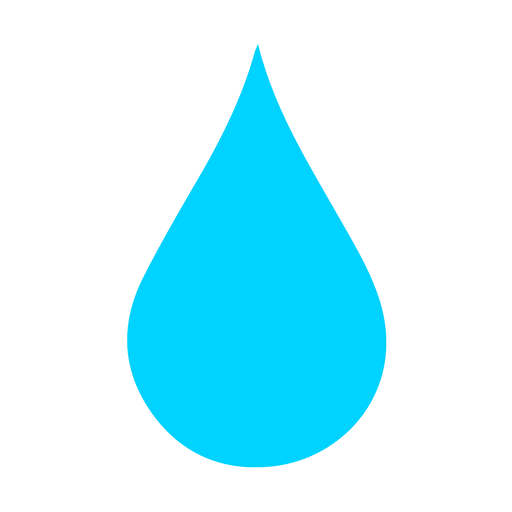
In The Wash is your guide to the best laundry and cleaning products, tips and tricks. Our mission is to solve the UK’s cleaning and laundry dilemmas!
